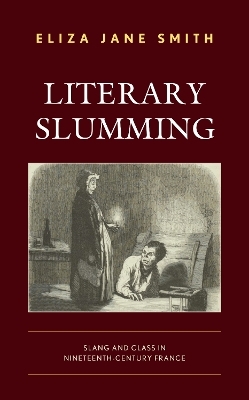
Literary Slumming
Slang and Class in Nineteenth-Century France
Seiten
2023
Lexington Books (Verlag)
978-1-7936-2116-0 (ISBN)
Lexington Books (Verlag)
978-1-7936-2116-0 (ISBN)
Literary Slumming: Slang and Class in Nineteenth-Century France reveals how the use of slang in French literature and culture led to the emergence of a sociolinguistic phenomenon that prioritized criminal life and culture in a way that expanded class boundaries and increased visibility for minorities within the public sphere.
Literary Slumming: Slang and Class in Nineteenth-Century France applies a sociolinguistic approach to the representation of slang in French literature and dictionaries to reveal the ways in which upper-class writers, lexicographers, literary critics, and bourgeois readers participated in a sociolinguistic concept the author refers to as “literary slumming”, or the appropriation of lower-class and criminal language and culture. Through an analysis of spoken and embodied manifestations of the anti-language of slang in the works of Eugène François Vidocq, Honoré de Balzac, Eugène Sue, Victor Hugo, the Goncourt Brothers, and Émile Zola, Literary Slumming argues that the nineteenth-century French literary discourse on slang led to the emergence of this sociolinguistic phenomenon that prioritized lower-class and criminal life and culture in a way that ultimately expanded class boundaries and increased visibility and agency for minorities within the public sphere.
Literary Slumming: Slang and Class in Nineteenth-Century France applies a sociolinguistic approach to the representation of slang in French literature and dictionaries to reveal the ways in which upper-class writers, lexicographers, literary critics, and bourgeois readers participated in a sociolinguistic concept the author refers to as “literary slumming”, or the appropriation of lower-class and criminal language and culture. Through an analysis of spoken and embodied manifestations of the anti-language of slang in the works of Eugène François Vidocq, Honoré de Balzac, Eugène Sue, Victor Hugo, the Goncourt Brothers, and Émile Zola, Literary Slumming argues that the nineteenth-century French literary discourse on slang led to the emergence of this sociolinguistic phenomenon that prioritized lower-class and criminal life and culture in a way that ultimately expanded class boundaries and increased visibility and agency for minorities within the public sphere.
Eliza Jane Smith is assistant professor of French and Francophone studies at the University of San Diego.
Introduction: Literary Slumming in Nineteenth-Century France
Prologue: Slang as Premodern Anti-Language
Chapter 1: Slang as Criminal Code
Chapter 2: Slang as Embodied Language
Chapter 3: Slang as Language Politics
Chapter 4: Slang as the Language of Misery
Chapter 5: Slang as the Language of Parisians
Chapter 6: Slang as the Language of Whores
Epilogue: Literary Slumming Across Cultures
| Erscheinungsdatum | 13.01.2023 |
|---|---|
| Verlagsort | Lanham, MD |
| Sprache | englisch |
| Maße | 154 x 223 mm |
| Gewicht | 472 g |
| Themenwelt | Geisteswissenschaften ► Sprach- / Literaturwissenschaft ► Anglistik / Amerikanistik |
| Geisteswissenschaften ► Sprach- / Literaturwissenschaft ► Literaturgeschichte | |
| ISBN-10 | 1-7936-2116-0 / 1793621160 |
| ISBN-13 | 978-1-7936-2116-0 / 9781793621160 |
| Zustand | Neuware |
| Informationen gemäß Produktsicherheitsverordnung (GPSR) | |
| Haben Sie eine Frage zum Produkt? |
Mehr entdecken
aus dem Bereich
aus dem Bereich
Poetik eines sozialen Urteils
Buch | Hardcover (2023)
De Gruyter (Verlag)
59,95 €
Buch | Softcover (2024)
belleville (Verlag)
20,00 €


